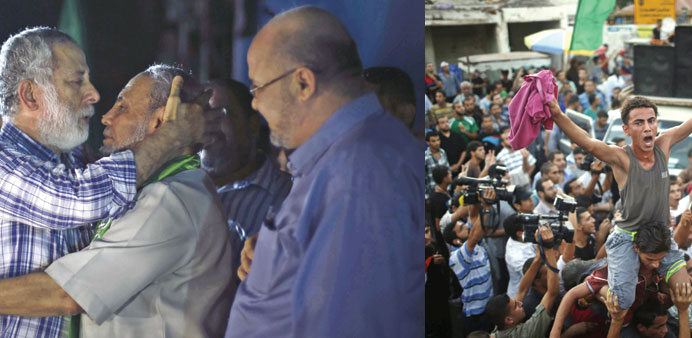Palestinians celebrating in Gaza City yesterday.
Hamas leader Mahmoud al-Zahar, centre, hugs Islamic Jihad leader Mohamed al-Hindi during a celebratory rally in Gaza City yesterday.
AFP
Gaza City
|
|
Celebrations erupted in Gaza yesterday as a long-term ceasefire agreed by Israel and the Palestinians began, ending 50 days of the deadliest violence in a decade.
The agreement, effective since 1600 GMT, involves an immediate halt to the violence in Gaza, which erupted on July 8 and has claimed the lives of 2,143 Palestinians and 69 on the Israeli side.
The Palestinians said it was a “permanent” truce, while a senior Israeli official described it as “unconditional and unlimited in time”.
Washington gave its full backing to the deal. “We strongly support the ceasefire announcement,” US State Department spokeswoman Jen Psaki said.
UN Secretary-General Ban Ki-moon voiced hope that the ceasefire in Gaza would set the stage for talks on a final Israeli-Palestinian peace deal.
In Gaza itself, thousands flooded on to the streets in celebration, some firing joyfully into the air, among them gunmen from Hamas.
Chanting and clapping they surged through the battered streets, bellowing songs of victory as a man swathed in a huge green Hamas flag threw handfuls of sweets into the air.
Mosques used their loudspeakers to broadcast celebratory chants of “God is greatest” as the war-torn enclave hailed the apparent end to seven weeks of violence that has seen a quarter of the territory’s 1.8mn people flee their homes.
“Thank God the war is ended. I can’t believe I’m still alive with my kids!” 32-year-old Maha Khaled told AFP.
“It was a very harsh war. I never thought that we would see peace at the end.”
Cars jammed the streets, their horns honking incessantly, as beaming women and children held up the victory sign and crowds of young men bounced up and down on nearby rooftops, waving flags.
As night fell, there was no letup in the celebrations as the rhythmic thud of drums beat a celebratory note and a performer breathed fire to entertain the ecstatic crowd.
“Today Gaza showed the world that it is resisting and that it is stronger than Israel,” said Tamer al-Madqa, 23.
But there was no sign of celebration in Israel as citizens absorbed the news of two people killed when mortar shells hit a kibbutz in the south.
Ministers in Prime Minister Benjamin Netanyahu’s cabinet began whetting their political knives after a deal which was reportedly agreed by premier and his defence minister, with other security cabinet ministers only updated by phone.
News of the agreement first emerged from the West Bank city of Ramallah where a Palestinian official told AFP an elusive deal had been reached over a “durable” halt to more than seven weeks of bloodshed and violence in and around Gaza.
He said the deal involved a “permanent ceasefire” and an end to Israel’s eight-year blockade in a move hailed by Hamas as a “victory for the resistance”.
Ending the blockade had been a key Palestinian demand in earlier, abortive truce talks in Cairo.
“The Egyptian initiative (includes) an opening of the crossings for goods and humanitarian and food aid to enter Gaza, as well as medical supplies and materials to repair the water, electricity and mobile phone networks,” chief Palestinian truce negotiator Azzam al-Ahmed told AFP.
Restrictions on fishing would end “immediately” with boats allowed to fish up to six miles offshore with the limit later extended to 12 miles, he said.
At a later, unspecified date, the two sides would discuss “the exchange of (Palestinian) prisoners and of the bodies of those (Israeli soldiers) killed” during the conflict, he said.
Israel confirmed the negotiating teams would return to Cairo “within a month” without saying when.
During the celebrations, several senior Hamas and Islamic Jihad figures emerged onto the streets for the first time since the war began for fear of being assassinated by Israel which had labelled them “legitimate targets”.
As well as rebuilding the battered enclave, senior Hamas official Mahmoud al-Zahar said the movement would continue “arming itself and developing its resistance capacity”.

